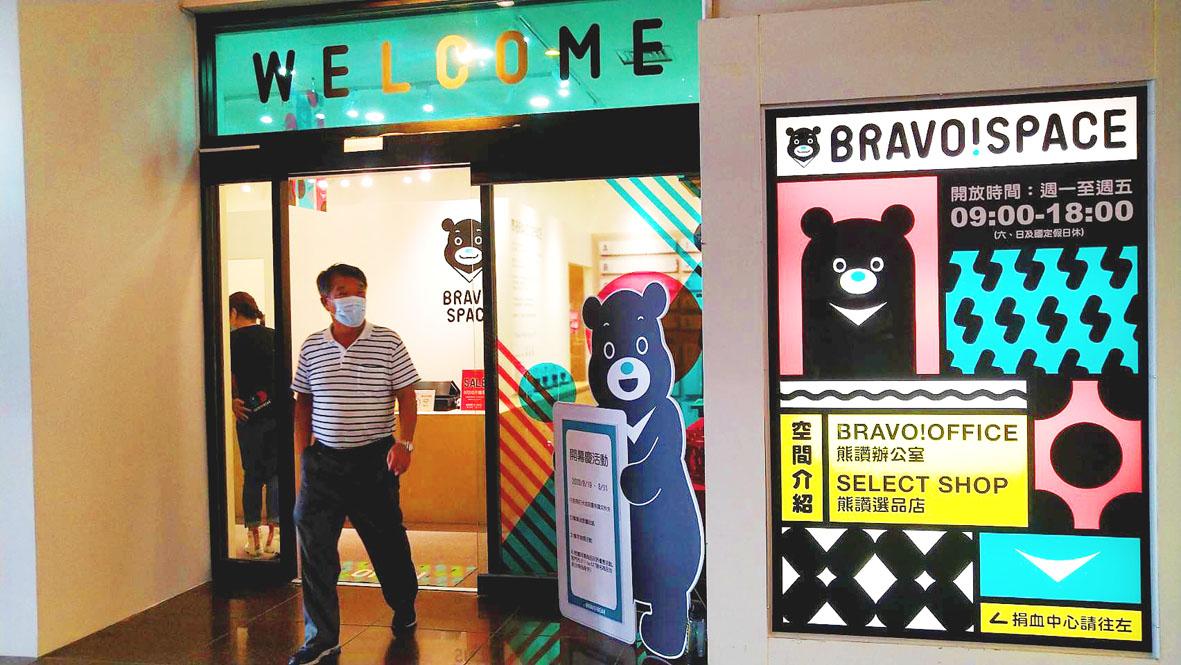The Taipei City Government should not charge local businesses licensing fees for using the city mascot, Bravo the Bear, in their advertising, a Taipei city councilor said yesterday.
The bear is an asset that belongs to all Taipei residents, Democratic Progressive Party Taipei City Councilor Hsu Shu-hua (許淑華) said, adding that it would raise the mascot’s profile if all businesses could use the mascot free of charge — at least until it has gained popularity and firms make a profit from campaigns including the bear.
Hsu cited Kumamon, the mascot that represents Japan’s Kumamoto Prefecture as an example.

Photo: Tsai Ya-hua, Taipei Times
The prefecture licensed the image rights of Kumamon to private companies free of charge, she said, adding that it the mascot is to be seen everywhere in Japan.
Municipal funds allocated for the brand management of Bravo the Bear are NT$8.5 million (US$ 287,931) annually and cover the costs of event participation, management of the mascot’s Facebook page, licensing, and the establishment and operations of the Bravo Office, a mascot brand store, the Taipei Department of Information and Tourism said.
The store, located at Taipei City Hall, opened on Aug. 19 and features products, pictures and stories related to the mascot brand.
Department Director-General Hung Mei-yun (洪梅雲) yesterday said that the mascot in 2018 generated NT$1.67 million in licensing fees.
As its revenue dropped to about NT$400,000 last year, the department outsourced its licensing affairs to improve the mascot’s marketing, Hung said.
More and better promotional activities and products are coordinated by an external company, Hung added.
In response to Hsu mentioning Kumamon, Hung said that the Japanese prefecture had marketed the mascot for several years before it rose to prominence.
This year’s operations have been hampered by the COVID-19 pandemic, even though the Bravo Office has performed well, earning nearly NT$100,000 in revenue on its opening day, she said.
The department expects the office to generate an annual income of NT$1 million, she said, adding that the ultimate goal is making Bravo the Bear a self-sufficient business within the city government.

The manufacture of the remaining 28 M1A2T Abrams tanks Taiwan purchased from the US has recently been completed, and they are expected to be delivered within the next one to two months, a source said yesterday. The Ministry of National Defense is arranging cargo ships to transport the tanks to Taiwan as soon as possible, said the source, who is familiar with the matter. The estimated arrival time ranges from late this month to early next month, the source said. The 28 Abrams tanks make up the third and final batch of a total of 108 tanks, valued at about NT$40.5 billion

A group from the Taiwanese Designers in Australia association yesterday represented Taiwan at the Midsumma Pride March in Melbourne. The march, held in the St. Kilda suburb, is the city’s largest LGBTQIA+ parade and the flagship event of the annual Midsumma Festival. It attracted more than 45,000 spectators who supported the 400 groups and 10,000 marchers that participated this year, the association said. Taiwanese Designers said they organized a team to march for Taiwan this year, joining politicians, government agencies, professionals and community organizations in showing support for LGBTQIA+ people and diverse communities. As the first country in Asia to legalize same-sex

Travel agencies in Taiwan are working to secure alternative flights for travelers bound for New Zealand for the Lunar New Year holiday, as Air New Zealand workers are set to strike next week. The airline said that it has confirmed that the planned industrial action by its international wide-body cabin crew would go ahead on Thursday and Friday next week. While the Auckland-based carrier pledged to take reasonable measures to mitigate the impact of the workers’ strike, an Air New Zealand flight arriving at Taipei from Auckland on Thursday and another flight departing from Taipei for Auckland on Saturday would have to

MOTIVES QUESTIONED The PLA considers Xi’s policies toward Taiwan to be driven by personal considerations rather than military assessment, the Epoch Times reports Chinese President Xi Jinping’s (習近平) latest purge of the Chinese People’s Liberation Army (PLA) leadership might have been prompted by the military’s opposition to plans of invading Taiwan, the Epoch Times said. The Chinese military opposes waging war against Taiwan by a large consensus, putting it at odds with Xi’s vision, the Falun Gong-affiliated daily said in a report on Thursday, citing anonymous sources with insight into the PLA’s inner workings. The opposition is not the opinion of a few generals, but a widely shared view among the PLA cadre, the Epoch Times cited them as saying. “Chinese forces know full well that